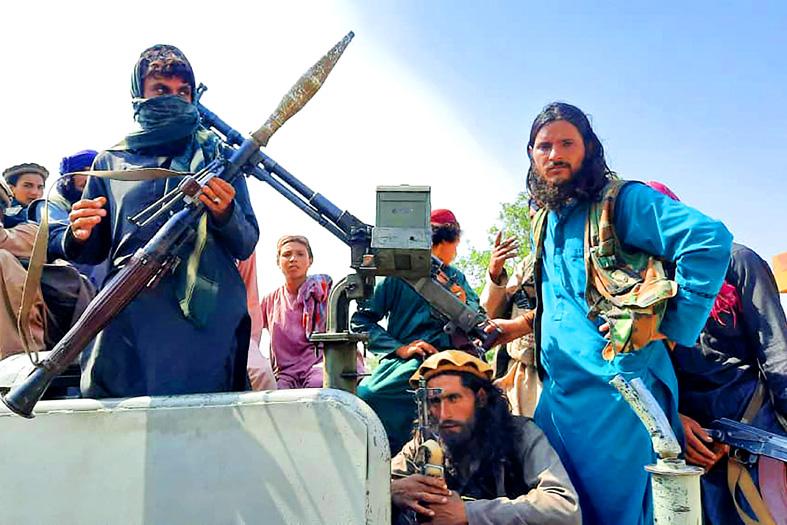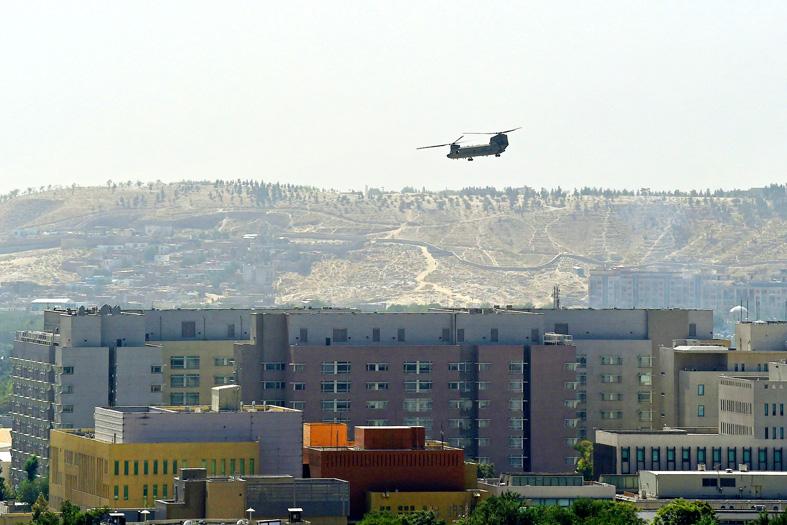Afghan President Ashraf Ghani has left the capital, Kabul, for Tajikistan, a senior Afghan Ministry of the Interior official said yesterday.
Asked for comment, the president’s office said it “cannot say anything about Ashraf Ghani’s movement for security reasons.”
A representative of the Taliban, whose leaders entered Kabul earlier yesterday, said the group was checking on Ghani’s whereabouts.

Photo: AFP
The Taliban wants to take control of Afghanistan “in the next few days,” a spokesman for the group told the BBC yesterday as its fighters encircled the capital.
“In next few days, we want a peaceful transfer,” Suhail Shaheen, who is based in Qatar as part of the group’s negotiating team, told the BBC.
Shaheen laid out the policies of the Taliban ahead of an expected power transfer that would reinstall the hardline Islamic group two decades after US-led forces toppled it in the wake of the Sept. 11, 2001, attacks.

Photo: AFP
“We want an inclusive Islamic government ... that means all Afghans will be part of that government,” Shaheen said. “We will see that in the future as the peaceful transfer is taking place.”
He also said foreign embassies and workers would not be targeted by the group’s fighters and they should remain in the country.
“There will be no risk to diplomats, NGOs, to anyone. All should continue their work as they were continuing in the past. They won’t harm them, they should remain,” he said.
Rebuffing fears that the country would be plunged back to the dark days of the group’s ultra-conservative version of Islamic law, Shaheen said the Taliban will instead seek a “new chapter” of tolerance.
“We want to work with any Afghan, we want to open a new chapter of peace, tolerance, peaceful coexistence and national unity for the country and for the people of Afghanistan,” he said.
However, many officials, soldiers and police have surrendered or abandoned their posts, fearing reprisals against anyone suspected of working with the Western-backed government or Western forces.
Shaheen said that would not happen.
“We reassure that there is no revenge on anyone. Any case will be investigated,” he said.
The Doha-based spokesman said the group would also review its relationship with the US, which it has waged a deadly insurgency against for decades.
“Our relationship was in the past,” he said. “In future, if it will touch our agenda no more, it will be a new chapter of cooperation.”
Taliban militants surrounded Kabul following an astonishing rout of government forces and warlord militias achieved in just 10 days.
Rapid shuttle flights of helicopters near the US embassy began a few hours after the militants seized the nearby city of Jalalabad — which had been the last major city besides the capital not in Taliban hands.
An official yesterday said that US diplomats were being moved from the embassy to the airport.
The official said military helicopters were shuttling between the embassy compound and the airport, where a core presence would remain for as long as possible given security conditions.

MAKING WAVES: China’s maritime militia could become a nontraditional threat in war, clogging up shipping lanes to prevent US or Japanese intervention, a report said About 1,900 Chinese ships flying flags of convenience and fishing vessels that participated in China’s military exercises around Taiwan last month and in January last year have been listed for monitoring, Coast Guard Administration (CGA) Deputy Director-General Hsieh Ching-chin (謝慶欽) said yesterday. Following amendments to the Commercial Port Act (商港法) and the Law of Ships (船舶法) last month, the CGA can designate possible berthing areas or deny ports of call for vessels suspected of loitering around areas where undersea cables can be accessed, Oceans Affairs Council Minister Kuan Bi-ling (管碧玲) said. The list of suspected ships, originally 300, had risen to about

DAREDEVIL: Honnold said it had always been a dream of his to climb Taipei 101, while a Netflix producer said the skyscraper was ‘a real icon of this country’ US climber Alex Honnold yesterday took on Taiwan’s tallest building, becoming the first person to scale Taipei 101 without a rope, harness or safety net. Hundreds of spectators gathered at the base of the 101-story skyscraper to watch Honnold, 40, embark on his daredevil feat, which was also broadcast live on Netflix. Dressed in a red T-shirt and yellow custom-made climbing shoes, Honnold swiftly moved up the southeast face of the glass and steel building. At one point, he stepped onto a platform midway up to wave down at fans and onlookers who were taking photos. People watching from inside

Japan’s strategic alliance with the US would collapse if Tokyo were to turn away from a conflict in Taiwan, Japanese Prime Minister Sanae Takaichi said yesterday, but distanced herself from previous comments that suggested a possible military response in such an event. Takaichi expressed her latest views on a nationally broadcast TV program late on Monday, where an opposition party leader criticized her for igniting tensions with China with the earlier remarks. Ties between Japan and China have sunk to the worst level in years after Takaichi said in November that a hypothetical Chinese attack on Taiwan could bring about a Japanese

STREAMLINED: The dedicated funding would allow the US to transfer equipment to Taiwan when needed and order upgraded replacements for stockpiles, a source said The US House of Representatives on Thursday passed a defense appropriations bill totaling US$838.7 billion, of which US$1 billion is to be allocated to reinforcing security cooperation with Taiwan and US$150 million to replace defense articles provided to the nation. These are part of the Consolidated Appropriation Act, which the US House yesterday passed with 341 votes in favor and 88 against. The act must be passed by the US Senate before Friday next week to avoid another government shutdown. The US House Committee on Appropriations on Monday unveiled the act, saying that it allocates US$1 billion for the Taiwan Security Cooperation Initiative